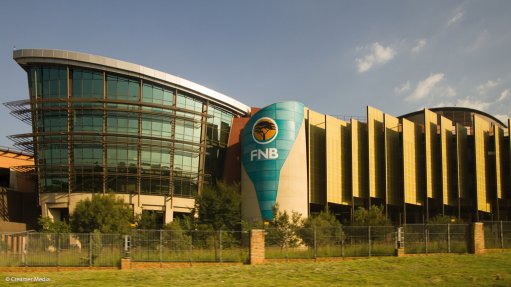
Photo by: Creamer Media
Following the South African Reserve Bank’s (SARB) decision to keep the repo rate unchanged, FNB will similarly maintain its prime lending rate at 7% and will review its position after the next Monetary Policy Committee (MPC) meeting in May.
FNB CEO, Jacques Celliers says, “Against the backdrop of easing lockdown restrictions and a reassuring National Budget, the SARB’s decision provides further impetus for more sustainable economic activity. In our business, we’ve also observed increased economic activity among our Retail and Commercial customers. We expect the positive economic trajectory to gather pace in the months ahead, subject to the possibility of a third wave of Covid-19 and its impact on the economy.”
“Despite the positive signs, we urge customers to continue managing credit responsibly, coupled with reasonable financial buffers. As reported in our recent Interim results to end of December 2020, we have noted strong growth in deposits and even stronger growth in digital adoption. As a result, digital solutions like our FNB App-based nav»Money for consumers and marketplace for SMEs continue to scale rapidly. We now have more than 1.7 million nav»Money users who are digitally assisted to manage credit, saving and spending. In addition, more than 2 000 SMEs are already using our marketplace to provide home services to millions of customers via our digital platform,” adds Celliers.
FNB Chief Economist, Mamello Matikinca-Ngwenya says, “The decision to keep policy rates unchanged was expected and should be read as the SARB’s attempt to strike a healthy balance between rising inflation risks and the relatively fragile growth outlook. In recent months we have seen growing signs of tightening global financial conditions and rising concerns over the medium- to long-term inflation outlook. Domestically, inflation is expected to trend higher in the coming months, albeit still anchored within the target band, amid rising food, fuel, and electricity prices.”
“For this year, we expect inflation to average 4.4%, up from 3.3% last year. At this stage, however, these developments are not enough to yield a change in the policy rate, given that the economy is still in need of support. Nevertheless, we expect GDP growth to rebound to 3.7% this year, following a deep contraction of 7.0% in 2020, supported by stronger global demand. The risk to this view is a third wave of the virus, which will lead to further lockdown measures. Barring any major shocks to growth, we expect the SARB to keep rates steady throughout the year,” concludes Matikinca-Ngwenya.
Notes to the editor:
FNB customers have access to digital channels to manage their finances from anywhere. Not only do these cater for traditional banking, credit, and investment needs but the nav>> suite of services support various needs including budgeting, property, vehicle, and other day-to-day matters:
· nav>>Home makes it possible to view properties, get valuations on existing properties and apply for finance, and it connects local small, medium-sized and microenterprises and pre-vetted tradesmen with homeowners for safe, trusted, and seamless service and payments.
· nav>>Car lets customers value their vehicles, pay traffic fines, and renew their vehicle licence discs from within the app.
· nav>>Money lets customers track their spending, compile budgets, and check their credit scores.
Issued by FNB